Alison Stuart's Blog, page 27
June 27, 2013
Taking Tea with Ms. Stuart
Tea...an innocuous infusion of the cured leaf of the camellia sinensis tree in hot water.

Hard to believe that this simple leaf has been the cause of wars and was once so priceless it had to be stored in locked cabinets. It is synonymous with the British and the Chinese cultures and the tea ceremonies of Asia, particularly Japan, are complex and fraught with significance. Many a family problem is sorted over a "good, strong cuppa" and it is produced in times of stress and emotion to calm the nerves.
Writing stories set in the seventeenth century means there is little opportunity to introduce tea drinking* (as it did not come into Britain until the 18th century) but in GATHER THE BONES, set in 1923, tea makes a frequent appearance.
I am, of course, anglo saxon in my origins and upbringing. Tea, strong with a good slosh of milk, flows through my veins. One coffee (fresh beans of course - I would die before I drank instant coffee again!) to start the heart in the morning and then a good cup of tea mid-morning and another in the afternoon. It is so much more than just a drink. It is a punctuation mark in my day. A time to stop and reflect on how the day is going and what needs to be done next. It is a social icebreakers...my first instinct on seeing a visitor at the door is to offer them a cup of tea.
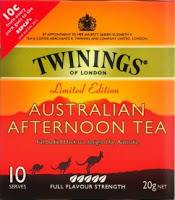 My pantry groans with every variety of the good camellia sinensis and a selection of "fruit" and "herbal" teas but when pushed into a corner, I revert to a traditional black tea. Of late I have become rather fond of Twining's (so called limited edition) Australian Afternoon Tea. It is probably just the sweepings of the floor with a fancy label but who cares, it hits the spot!
My pantry groans with every variety of the good camellia sinensis and a selection of "fruit" and "herbal" teas but when pushed into a corner, I revert to a traditional black tea. Of late I have become rather fond of Twining's (so called limited edition) Australian Afternoon Tea. It is probably just the sweepings of the floor with a fancy label but who cares, it hits the spot!
Even in British culture there are so many 'traditions' around tea...does one pre heat the tea pot? How many spoons (one per person and one for the pot)? Milk first and then tea or tea first and then milk (I tend to the latter)? Do you take the pot to the cup or the cup to the pot? Personally I find the tea bag, stick it in nice mug and pour the boiling water over it, BUT I do love an occasion to bring out my lovely Villeroy and Boch tea pot or on high days, my silver tea pot (which pours like a dream).
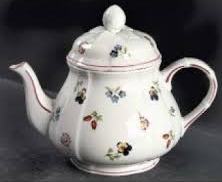 My favourite tea potWhen I lived in Singapore, that curious blend of cultures eponymised by that small city state came to the fore. Every posh hotel had its own version of "High Tea", a hark back to the languid colonial days when the taking of tea, accompanied by a substantial repaste filled in the long hours of the afternoon and quelled the hunger pains before the formal evening meal (that often did not start until after 8.00 pm).
My favourite tea potWhen I lived in Singapore, that curious blend of cultures eponymised by that small city state came to the fore. Every posh hotel had its own version of "High Tea", a hark back to the languid colonial days when the taking of tea, accompanied by a substantial repaste filled in the long hours of the afternoon and quelled the hunger pains before the formal evening meal (that often did not start until after 8.00 pm).
If it is travel advice you are after, I would advise you resist Raffles and its much hyped High Tea and go instead to the Shangri La Hotel (just off Orchard Road), where a tea menu is presented for your delectation and served in elegant Wedgwood china (also the food is better!).
At the other end of the cultural spectrum, I was a frequent visitor to a tea shop in Chinatown where the proprietor would, with great dignity, talk about the history of tea in Chinese society and take us step by step with the fine art of the Chinese tea ceremony (which involves much sloshing of water in great contrast to a Japanese tea ceremony where the slightest misplaced drop of water would be a disaster). At this tea shop, frequent visitors kept their own blends in a locked cabinet, somewhat akin to a humidifier in a cigar shop. A delicate yum cha always rounded off the visit.
I love my American friends but I am afraid that, culturally, I am yet to meet a decent cup of tea in America. This probably dates from the time someone suggested tea mixed with the water of Boston Harbor might make a heady brew and frankly most tea I have drunk in America still tastes like it has been made with the water of Boston Harbor. I have taken tea at the Grand Hyatt in Washington where the beautifully coiffed grand dames of Washington Society gathered, little pinkies poised (where did that idea come from?) over afternoon tea. Gasping for a decent cup, you can imagine my disappointment when my tea arrived on a well appointed tray with linen napkin and in a proper tea pot...accompanied by whatever white stuff passes for coffee cream, so beloved of the Americans. MILK, people, you drink proper milk with tea - NEVER cream and never, ever, powdered coffee cream!
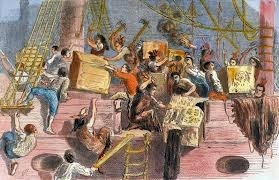 The Boston Tea Party
The Boston Tea Party
On one of our visits to Washington we took time out to visit friends on a posting to the JAG school in Charlottesville. This particular friend is a most proper gentleman so fearing he may be mourning a good gin and tonic, we went stocked with Bombay Sapphire, which he accepted most graciously. With a long face, he said, if he had thought about it, he would have asked for some decent tea and produced from the pantry a packet of dried brown leaves which had the instructions for making tea in a coffee dripolator on the side. He quivered in indignation and I have to agree, having stayed in many American hotels, tea made with hot water from a coffee machine and drunk with powdered coffee cream is the devil's own brew.
So many stories...so many cups of tea: Japanese tea ceremonies, Nepalese tea, Russian tea (apparently the national drink of Russia...not vodka), army tea (was it really infused with bromide?), billy tea and damper...these I will save for another day.
It is such a social drink that Ms. Stuart has decided that she will invite her writer friends to partake in the occasional cup with her and discuss books and writing in a civilised fashion. Watch this space for my new column "Taking tea with Ms. Stuart..."
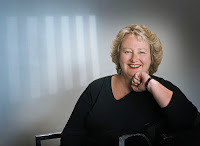 Anna Campbell
Anna Campbell
In fact Ms. Stuart is delighted that best selling author and raconteur Ms. Anna Campbell has sent back her card and agreed to be the first to take tea with her. For delightful conversation and the sampling of the camellia sinensis, Ms. Campbell will be taking tea with Ms.Stuart on Friday 5th July. A Giveaway is promised...
All this talk of tea...and a quick glance at the clock reminds me it is time to partake of my morning beverage. Would anyone care to join me, and please if you have a moment, do share a short comment about your favourite type of tea or a tea travel story.
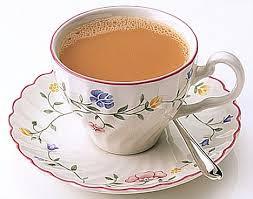 Ahhhh......*Post script: I did however get an opportunity to introduce coffee in THE KING'S MAN. Coffee first arrived in London in the early 1650s
Ahhhh......*Post script: I did however get an opportunity to introduce coffee in THE KING'S MAN. Coffee first arrived in London in the early 1650s

Hard to believe that this simple leaf has been the cause of wars and was once so priceless it had to be stored in locked cabinets. It is synonymous with the British and the Chinese cultures and the tea ceremonies of Asia, particularly Japan, are complex and fraught with significance. Many a family problem is sorted over a "good, strong cuppa" and it is produced in times of stress and emotion to calm the nerves.
Writing stories set in the seventeenth century means there is little opportunity to introduce tea drinking* (as it did not come into Britain until the 18th century) but in GATHER THE BONES, set in 1923, tea makes a frequent appearance.
I am, of course, anglo saxon in my origins and upbringing. Tea, strong with a good slosh of milk, flows through my veins. One coffee (fresh beans of course - I would die before I drank instant coffee again!) to start the heart in the morning and then a good cup of tea mid-morning and another in the afternoon. It is so much more than just a drink. It is a punctuation mark in my day. A time to stop and reflect on how the day is going and what needs to be done next. It is a social icebreakers...my first instinct on seeing a visitor at the door is to offer them a cup of tea.
 My pantry groans with every variety of the good camellia sinensis and a selection of "fruit" and "herbal" teas but when pushed into a corner, I revert to a traditional black tea. Of late I have become rather fond of Twining's (so called limited edition) Australian Afternoon Tea. It is probably just the sweepings of the floor with a fancy label but who cares, it hits the spot!
My pantry groans with every variety of the good camellia sinensis and a selection of "fruit" and "herbal" teas but when pushed into a corner, I revert to a traditional black tea. Of late I have become rather fond of Twining's (so called limited edition) Australian Afternoon Tea. It is probably just the sweepings of the floor with a fancy label but who cares, it hits the spot!Even in British culture there are so many 'traditions' around tea...does one pre heat the tea pot? How many spoons (one per person and one for the pot)? Milk first and then tea or tea first and then milk (I tend to the latter)? Do you take the pot to the cup or the cup to the pot? Personally I find the tea bag, stick it in nice mug and pour the boiling water over it, BUT I do love an occasion to bring out my lovely Villeroy and Boch tea pot or on high days, my silver tea pot (which pours like a dream).
 My favourite tea potWhen I lived in Singapore, that curious blend of cultures eponymised by that small city state came to the fore. Every posh hotel had its own version of "High Tea", a hark back to the languid colonial days when the taking of tea, accompanied by a substantial repaste filled in the long hours of the afternoon and quelled the hunger pains before the formal evening meal (that often did not start until after 8.00 pm).
My favourite tea potWhen I lived in Singapore, that curious blend of cultures eponymised by that small city state came to the fore. Every posh hotel had its own version of "High Tea", a hark back to the languid colonial days when the taking of tea, accompanied by a substantial repaste filled in the long hours of the afternoon and quelled the hunger pains before the formal evening meal (that often did not start until after 8.00 pm).If it is travel advice you are after, I would advise you resist Raffles and its much hyped High Tea and go instead to the Shangri La Hotel (just off Orchard Road), where a tea menu is presented for your delectation and served in elegant Wedgwood china (also the food is better!).
At the other end of the cultural spectrum, I was a frequent visitor to a tea shop in Chinatown where the proprietor would, with great dignity, talk about the history of tea in Chinese society and take us step by step with the fine art of the Chinese tea ceremony (which involves much sloshing of water in great contrast to a Japanese tea ceremony where the slightest misplaced drop of water would be a disaster). At this tea shop, frequent visitors kept their own blends in a locked cabinet, somewhat akin to a humidifier in a cigar shop. A delicate yum cha always rounded off the visit.
I love my American friends but I am afraid that, culturally, I am yet to meet a decent cup of tea in America. This probably dates from the time someone suggested tea mixed with the water of Boston Harbor might make a heady brew and frankly most tea I have drunk in America still tastes like it has been made with the water of Boston Harbor. I have taken tea at the Grand Hyatt in Washington where the beautifully coiffed grand dames of Washington Society gathered, little pinkies poised (where did that idea come from?) over afternoon tea. Gasping for a decent cup, you can imagine my disappointment when my tea arrived on a well appointed tray with linen napkin and in a proper tea pot...accompanied by whatever white stuff passes for coffee cream, so beloved of the Americans. MILK, people, you drink proper milk with tea - NEVER cream and never, ever, powdered coffee cream!
 The Boston Tea Party
The Boston Tea PartyOn one of our visits to Washington we took time out to visit friends on a posting to the JAG school in Charlottesville. This particular friend is a most proper gentleman so fearing he may be mourning a good gin and tonic, we went stocked with Bombay Sapphire, which he accepted most graciously. With a long face, he said, if he had thought about it, he would have asked for some decent tea and produced from the pantry a packet of dried brown leaves which had the instructions for making tea in a coffee dripolator on the side. He quivered in indignation and I have to agree, having stayed in many American hotels, tea made with hot water from a coffee machine and drunk with powdered coffee cream is the devil's own brew.
So many stories...so many cups of tea: Japanese tea ceremonies, Nepalese tea, Russian tea (apparently the national drink of Russia...not vodka), army tea (was it really infused with bromide?), billy tea and damper...these I will save for another day.
It is such a social drink that Ms. Stuart has decided that she will invite her writer friends to partake in the occasional cup with her and discuss books and writing in a civilised fashion. Watch this space for my new column "Taking tea with Ms. Stuart..."
 Anna Campbell
Anna CampbellIn fact Ms. Stuart is delighted that best selling author and raconteur Ms. Anna Campbell has sent back her card and agreed to be the first to take tea with her. For delightful conversation and the sampling of the camellia sinensis, Ms. Campbell will be taking tea with Ms.Stuart on Friday 5th July. A Giveaway is promised...
All this talk of tea...and a quick glance at the clock reminds me it is time to partake of my morning beverage. Would anyone care to join me, and please if you have a moment, do share a short comment about your favourite type of tea or a tea travel story.
 Ahhhh......*Post script: I did however get an opportunity to introduce coffee in THE KING'S MAN. Coffee first arrived in London in the early 1650s
Ahhhh......*Post script: I did however get an opportunity to introduce coffee in THE KING'S MAN. Coffee first arrived in London in the early 1650s
Published on June 27, 2013 15:01
June 19, 2013
Superstar and me
I think all generations are defined to a certain extent by the music of their teenage years (I suspect this is for no other reason than teenagers are the only ones with time to devote to listening to music!). For me that was the 1970s. I completely missed the 1980s (marriage, children et.) and nothing since has impacted on me in the same way as the last of the classically trained musicians did in the 1970s.
By far the greatest influence on my musical tastes of the time was the music of Andrew Lloyd Webber/Tim Rice (up to and including Cats...You can keep Phantom of the Opera). The brilliance of their marketing was in releasing a studio album of their upcoming blockbuster a year before it ever hit the stage, thus ensuring everyone knew the music and was hanging out for the stage show. So it was with Jesus Christ Superstar. Other defining (non Lloyd Webber) musical works of the day included Godspell and Hair (but I was too young to ever be allowed to see Hair and I don't think I have ever seen it!).
 The original studio recordingWhen I was 13, our local church started a "youth group". To show how incredibly cool and hip they were, the leaders procured the just released album of Superstar and devoted an hour each week to playing some of it to us...we would then of course discuss the biblical story and theological implications behind the music. Forget the bible, I was captivated by the music and saving my pocket money, bought that first double LP in its plain brown cover with just the simple logo on it - I think it cost about $5.00 (a huge sum in those days!). I played it almost to death on my parents ghastly 3-in-one "stereo". It still sits in a cupboard, unplayed in these days of CDs).
The original studio recordingWhen I was 13, our local church started a "youth group". To show how incredibly cool and hip they were, the leaders procured the just released album of Superstar and devoted an hour each week to playing some of it to us...we would then of course discuss the biblical story and theological implications behind the music. Forget the bible, I was captivated by the music and saving my pocket money, bought that first double LP in its plain brown cover with just the simple logo on it - I think it cost about $5.00 (a huge sum in those days!). I played it almost to death on my parents ghastly 3-in-one "stereo". It still sits in a cupboard, unplayed in these days of CDs).
The first Australian production of Jesus Christ Superstar came to the Palais Theatre in St. Kilda in about 1973. A school excursion was arranged and we were bussed there and back. Deep theological discussions were held on that return trip (it was a C of E girls school!). That first production starred Trevor White, Michelle Fawdon (later Marcia Hines) and the biggest heart throb of all, Jon English - tall and rangy with dark, soulful eyes you could drown in. I've always thought the character of Judas the more interesting of the two leads and Jon made it his own.
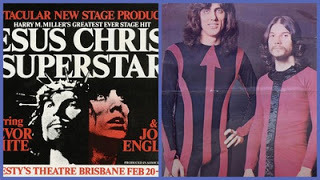 The original Australian production - Jon English and Trevor White
The original Australian production - Jon English and Trevor White
There were later productions, including a "concert" tour in the early 1990s with Jon Farnham as Jesus (and Jon Stevens who plays Pilate in the current production, playing Judas). But there has been no full scale production until the "Arena Spectacular", conceived in Britain and on its "world tour", hit Melbourne last week.
No dusty Palais Theatre this time...the rock concert venue of the Rod Laver Arena (familiar to lovers of tennis). I took my 17 year old niece as an excuse, interested in part to see how this new generation, brought up away from the influence of church youth groups, reacted to the story (she loved it but says she still prefers Phantom of the Opera). My generation were there in hordes and even the total strangers we sat next to were happy to reminisce with me about that original 1973 production.
The lights went down, the familiar haunting overture began and I was lost! I could not have forseen how fresh, this re-imagining of Superstar (set vaguely around the "Occupy" movement of 2012)...this now 40 year old musical...could be. You must understand I know EVERY word...I even know the musical interludes so yes, I picked up where they tweaked the words or slipped an extra verse in, but I sat entranced. When it was over I wanted it all to start again. The music of my generation revived and revisited. I was 14 again and seeing it all for the very first time.
 The Arena SpectacularAt interval I slipped out and bought the DVD (so I can watch it all again) and the "digitally remastered" CD of that original studio recording. Now I can play that familiar music again...and again...and again...and this time there will be no parent telling me to "Give it a rest!"
The Arena SpectacularAt interval I slipped out and bought the DVD (so I can watch it all again) and the "digitally remastered" CD of that original studio recording. Now I can play that familiar music again...and again...and again...and this time there will be no parent telling me to "Give it a rest!"
Oh and I have a new heartthrob...sorry Jon English but you have totally been forsaken for Tim Minchin of the eye coal and dreadlocks. He took that role from you and invested such humanity in Judas - thank heavens he is on the DVD...
 Tim Minchin as Judas
Tim Minchin as Judas
So...what music defined your growing up?
By far the greatest influence on my musical tastes of the time was the music of Andrew Lloyd Webber/Tim Rice (up to and including Cats...You can keep Phantom of the Opera). The brilliance of their marketing was in releasing a studio album of their upcoming blockbuster a year before it ever hit the stage, thus ensuring everyone knew the music and was hanging out for the stage show. So it was with Jesus Christ Superstar. Other defining (non Lloyd Webber) musical works of the day included Godspell and Hair (but I was too young to ever be allowed to see Hair and I don't think I have ever seen it!).
 The original studio recordingWhen I was 13, our local church started a "youth group". To show how incredibly cool and hip they were, the leaders procured the just released album of Superstar and devoted an hour each week to playing some of it to us...we would then of course discuss the biblical story and theological implications behind the music. Forget the bible, I was captivated by the music and saving my pocket money, bought that first double LP in its plain brown cover with just the simple logo on it - I think it cost about $5.00 (a huge sum in those days!). I played it almost to death on my parents ghastly 3-in-one "stereo". It still sits in a cupboard, unplayed in these days of CDs).
The original studio recordingWhen I was 13, our local church started a "youth group". To show how incredibly cool and hip they were, the leaders procured the just released album of Superstar and devoted an hour each week to playing some of it to us...we would then of course discuss the biblical story and theological implications behind the music. Forget the bible, I was captivated by the music and saving my pocket money, bought that first double LP in its plain brown cover with just the simple logo on it - I think it cost about $5.00 (a huge sum in those days!). I played it almost to death on my parents ghastly 3-in-one "stereo". It still sits in a cupboard, unplayed in these days of CDs).The first Australian production of Jesus Christ Superstar came to the Palais Theatre in St. Kilda in about 1973. A school excursion was arranged and we were bussed there and back. Deep theological discussions were held on that return trip (it was a C of E girls school!). That first production starred Trevor White, Michelle Fawdon (later Marcia Hines) and the biggest heart throb of all, Jon English - tall and rangy with dark, soulful eyes you could drown in. I've always thought the character of Judas the more interesting of the two leads and Jon made it his own.
 The original Australian production - Jon English and Trevor White
The original Australian production - Jon English and Trevor WhiteThere were later productions, including a "concert" tour in the early 1990s with Jon Farnham as Jesus (and Jon Stevens who plays Pilate in the current production, playing Judas). But there has been no full scale production until the "Arena Spectacular", conceived in Britain and on its "world tour", hit Melbourne last week.
No dusty Palais Theatre this time...the rock concert venue of the Rod Laver Arena (familiar to lovers of tennis). I took my 17 year old niece as an excuse, interested in part to see how this new generation, brought up away from the influence of church youth groups, reacted to the story (she loved it but says she still prefers Phantom of the Opera). My generation were there in hordes and even the total strangers we sat next to were happy to reminisce with me about that original 1973 production.
The lights went down, the familiar haunting overture began and I was lost! I could not have forseen how fresh, this re-imagining of Superstar (set vaguely around the "Occupy" movement of 2012)...this now 40 year old musical...could be. You must understand I know EVERY word...I even know the musical interludes so yes, I picked up where they tweaked the words or slipped an extra verse in, but I sat entranced. When it was over I wanted it all to start again. The music of my generation revived and revisited. I was 14 again and seeing it all for the very first time.
 The Arena SpectacularAt interval I slipped out and bought the DVD (so I can watch it all again) and the "digitally remastered" CD of that original studio recording. Now I can play that familiar music again...and again...and again...and this time there will be no parent telling me to "Give it a rest!"
The Arena SpectacularAt interval I slipped out and bought the DVD (so I can watch it all again) and the "digitally remastered" CD of that original studio recording. Now I can play that familiar music again...and again...and again...and this time there will be no parent telling me to "Give it a rest!"Oh and I have a new heartthrob...sorry Jon English but you have totally been forsaken for Tim Minchin of the eye coal and dreadlocks. He took that role from you and invested such humanity in Judas - thank heavens he is on the DVD...
 Tim Minchin as Judas
Tim Minchin as JudasSo...what music defined your growing up?
Published on June 19, 2013 16:40
June 7, 2013
A Traveller's Tales: Catherine's Palace and the Mystery of the Amber Room
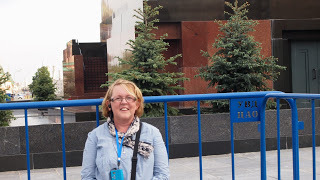 The author at Lenin's Mausoleum in Red SquareI have just returned from a trip to Russia. For a child of the cold war, Russia had never been high on my list of “must see” places but an opportunity arose for a 2 week waterways cruise from St. Petersburg to Moscow and who was I to say no? I have to say I loved every minute of the journey which went a long way to dispelling any lingering notions I may have had of Russia as the dark, dismal place of my childhood.
The author at Lenin's Mausoleum in Red SquareI have just returned from a trip to Russia. For a child of the cold war, Russia had never been high on my list of “must see” places but an opportunity arose for a 2 week waterways cruise from St. Petersburg to Moscow and who was I to say no? I have to say I loved every minute of the journey which went a long way to dispelling any lingering notions I may have had of Russia as the dark, dismal place of my childhood.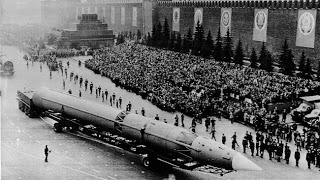 The Cold War Russia of my childhood.We began our travels in St. Petersburg. Leningrad, as it was renamed in 1924, is infamous for the 900 day siege by the German forces during World War 2 (Or the "Patriotic War" as the Russians call it). The German advance on Western Russia came so swiftly that Russia was ill prepared for it. The first German attack on Russian sovereignty came in June 1941 and by September of that year they were bombarding Leningrad. Staff of the Hermitage worked day and night to pack up over one million valuable works of art and 2 trains managed to get away before the blockade. The third train could not get through and the works of art spent the war in storage beneath St. Isaacs Cathedral. For an interesting story based on the life of the staff in the Hermitage, I recommend Debra Dean’s The Madonnas of Leningrad.
The Cold War Russia of my childhood.We began our travels in St. Petersburg. Leningrad, as it was renamed in 1924, is infamous for the 900 day siege by the German forces during World War 2 (Or the "Patriotic War" as the Russians call it). The German advance on Western Russia came so swiftly that Russia was ill prepared for it. The first German attack on Russian sovereignty came in June 1941 and by September of that year they were bombarding Leningrad. Staff of the Hermitage worked day and night to pack up over one million valuable works of art and 2 trains managed to get away before the blockade. The third train could not get through and the works of art spent the war in storage beneath St. Isaacs Cathedral. For an interesting story based on the life of the staff in the Hermitage, I recommend Debra Dean’s The Madonnas of Leningrad.The Germans occupied the outer reaches of Leningrad including the palaces of Peterhof and the collection of summer royal residences at Tsarkoye Selo ("Tsar's village"). The principle residence is that known as Catherine’s Palace, a magnificent confection of rococo/baroque/neoclassical architecture first started by Catherine I (the widow of Peter the Great). Other royal residences include the Alexander Palace where Tsar Nicholas II and his family were first imprisoned.
Our visit took us only to Catherine's Palace. Most famous in a palace noted for its excess of decoration was the “Amber Room”, an entire room paneled in amber – the gift of the Prussian Frederick Wilhelm I to Peter the Great. It is estimated that on final installation it measured 180 square feet, making a room that glowed with six tons of amber and other semi-precious stones. The amber panels were backed with gold leaf, and historians estimate that, at the time, the room was worth $142 million in today's dollars. Over time, the Amber Room was used as a private meditation chamber for Tsarina Elizabeth, a gathering room for Catherine the Great and a trophy space for amber connoisseur Alexander II. (see Smithsonian article).
As the Germans advanced on Tsakoye Selo the staff of the palace staff tried first to disassemble the valuable room but the amber proved to brittle and began to shatter. In an attempted ruse, the panels were covered with wallpaper but it did not take the German officials sent to source valuable works of art long to uncover the ruse and within 36 hours the Amber Room was removed, crated and sent to Germany where it was reassembled in Königsberg's castle museum on the Baltic Coast. That was the last that was ever seen or heard of the Amber Room.
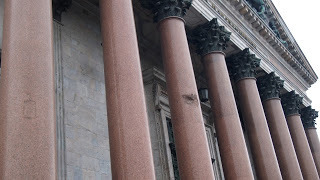 Shelling scars on St. Isaac's CathedralBack in Leningrad the siege dragged on. Millions of civilians died of starvation and disease. As a side note even the famed Hermitage cats were not spared the hunt for food! Following the war, cats had to be imported back into the city to take up the important rodent control duties in the Hermitage. Scars of the bombardment can still be seen on some of the buildings in St. Petersburg
Shelling scars on St. Isaac's CathedralBack in Leningrad the siege dragged on. Millions of civilians died of starvation and disease. As a side note even the famed Hermitage cats were not spared the hunt for food! Following the war, cats had to be imported back into the city to take up the important rodent control duties in the Hermitage. Scars of the bombardment can still be seen on some of the buildings in St. Petersburg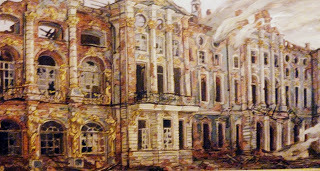 The destruction of Catherine's Palace in 1944The siege was finally lifted in January 1944 and as the Germans were pushed back, in one final act of vandalism they set about intentionally destroying the royal palaces. This picture, painted contemporaneously, shows the fire engulfing Catherine’s palace. Time bombs set in the cellar of the building failed to detonate.
The destruction of Catherine's Palace in 1944The siege was finally lifted in January 1944 and as the Germans were pushed back, in one final act of vandalism they set about intentionally destroying the royal palaces. This picture, painted contemporaneously, shows the fire engulfing Catherine’s palace. Time bombs set in the cellar of the building failed to detonate. The Grand Hall post WarSince the end of the war, Russian authorities began a painstaking reconstruction of the great palaces to the extent that a casual visitor would not know that what they are seeing was probably not original.
The Grand Hall post WarSince the end of the war, Russian authorities began a painstaking reconstruction of the great palaces to the extent that a casual visitor would not know that what they are seeing was probably not original. The Grand Hall in 2013 I love mysteries and the question remains as to the fate of the Amber Room. It was last seen at Königsberg Castle. In January 1945 as the war turned against Germany, “possessions” of the German higher echelon began to be moved. Eyewitnesses claimed to have seen crates containing the Amber Room panels waiting on a railway platform, others claim the crates were put aboard a ship that was later sunk or it may have been destroyed by allied bombing in 1944. Other claims include stories of it being stored in underground bunkers beneath Königsberg (now lost) or in nearby mines.
The Grand Hall in 2013 I love mysteries and the question remains as to the fate of the Amber Room. It was last seen at Königsberg Castle. In January 1945 as the war turned against Germany, “possessions” of the German higher echelon began to be moved. Eyewitnesses claimed to have seen crates containing the Amber Room panels waiting on a railway platform, others claim the crates were put aboard a ship that was later sunk or it may have been destroyed by allied bombing in 1944. Other claims include stories of it being stored in underground bunkers beneath Königsberg (now lost) or in nearby mines.Since World War 2 extensive searches by groups and treasure hunters have been conducted. See for example this 2011 article in the Daily Mail. However researches by journalists Catherine Scott-Clark and Adrian Levy conclude that the room was most likely destroyed in the 1944 bombing. This theory to some extent is supported by the discovery of one of the original stone mosaics in Germany in 1997, in the possession of the family of one of the soldiers tasked with packing the room up.
One other theory is that the panels were discovered intact by the advancing Russians safely stored in the cellars of the castle, however for propaganda reasons they decided to keep the discovery quiet. Amber disintegrates if it is not cared for and in the 1960s Soviet authorities destroyed the remains of the castle. Was this to hide the disintegration of this precious relic?
In 2003, the recreation of the Amber Room, based on the pre war black and white photos was opened by Putin. It had taken 20 years and cost $12million. Even knowing it is a reconstruction, as can be seen from the photos below, it remains jaw droppingly stunning, (as indeed is the whole of the palace).
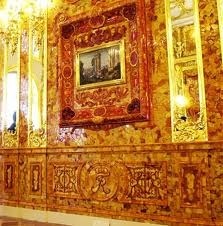

Published on June 07, 2013 23:14
May 18, 2013
Where in the world is Carmen Santiago?
Do you remember playing that game in the early days of computers? It was one I played with my kids and we loved it.
Well this is just a variation...Where in the world is Alison Stuart...?
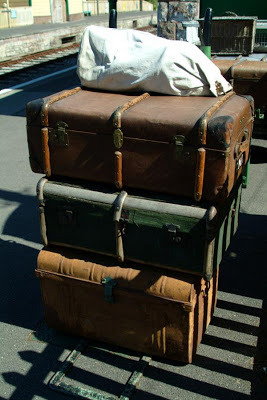
The steamer trunk is packed and I'm off on my travels. I am hoping that time and internet connections will allow me the occasional post but if I'm strangely silent for a couple of weeks you will know it is not that I am ignoring you...
Now guess where I am going? I can't wait to see this wonderful Rembrandt...
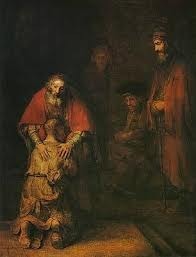
до свидания
Alison
Well this is just a variation...Where in the world is Alison Stuart...?

The steamer trunk is packed and I'm off on my travels. I am hoping that time and internet connections will allow me the occasional post but if I'm strangely silent for a couple of weeks you will know it is not that I am ignoring you...
Now guess where I am going? I can't wait to see this wonderful Rembrandt...

до свидания
Alison
Published on May 18, 2013 20:11
May 13, 2013
BOOK SELLERS BEST AWARDS - Gather the Bones
I am doing happy dances around the office! GATHER THE BONES is a finalist in the Paranormal/Time Travel/Futuristic category of the BOOK SELLERS BEST AWARDS.


Published on May 13, 2013 15:05
•
Tags:
alison-stuart, booksellers-best-awards-2013, gather-the-bones
May 6, 2013
Arthur - A Journey with Alzheimers
Do you ever read the dedications in a book? Like me, you probably just glance over them but behind each one is a personal story.
If you read the dedication in my recent release SECRETS IN TIME, you will have seen it reads “This book is dedicated to the memory of my father, Arthur. Still miss you, Dad.” I agonized over this dedication, which is the second dedication to my father (the first is in THE KING’S MAN). I wanted the dedication to be about more than just my father… it was a story that belonged not just to him but to all sufferers of Alzheimers and the people who cared for them, but in the end I brought it back to the deeply personal.
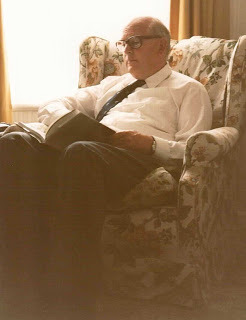 Arthur in his favourite chair with a book...how I like to remember himThe writing of SECRETS IN TIME is so intrinsically tied up with my father’s last few days, that as the anniversary of his death approaches, I feel, for the sake of all those out there who have lost a loved one to Alzheimers, that the time has come to share my personal experience of this terrible disease.
Arthur in his favourite chair with a book...how I like to remember himThe writing of SECRETS IN TIME is so intrinsically tied up with my father’s last few days, that as the anniversary of his death approaches, I feel, for the sake of all those out there who have lost a loved one to Alzheimers, that the time has come to share my personal experience of this terrible disease.
A father always holds a special place in the heart of a daughter and Dad and I were very close. He imbued in me his love of history and literature. Having been brought up in the Edwardian household of his grandparents, with very little contact from his divorced parents, his notions of parenting were, in retrospect, a little strange. A loner all his life, he disliked the bonhomie of “family” holidays, leaving my mother in charge of the two children while he went off on little adventures of his own but oh, we loved it when he was around, reassured by his large, gentle presence. His idea of entertainment (in the days before television) would be to spend Sunday afternoon reading to us. He particularly despised childrens’ books, reading instead his own favourites (which were probably not always suitable!). As a very sick child in hospital with meningitis he spent hours sitting by my bed reading Longfellow’s Hiawatha to me. I may not have understood the words but the cadence of the poetry read with his beautiful, very British accent was soothing to a young child.
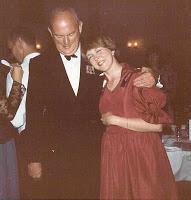 Arthur at my Graduation Ball with the newly commissioned LieutenantAs I grew into a teenager, we still shared our love of history, going to all the latest movies “Cromwell”, “Nicholas and Alexander” (in which I fainted and had to be removed…can’t stand people talking about blood), Elizabeth R, Ann of a Thousand Days etc. He quietly encouraged my writing and we shared long walks along the beach every weekend sharing our thoughts of the week (and annoying a particularly yappy dog, nicknamed by Dad "Drop Dead", by running his walking stick down the fence). He took such pride in every achievement , the greatest of which was being accepted into Law at the University of Melbourne, something he would have liked to study but for the intervention of a war. With romantic notions of the Oxford colleges he never attended, he insisted I move into a residential college and was always there to pick me up and take me back on weekend visits (a round trip of 2 hours). When I was commissioned as an officer in the Australian Army, he was thrilled (as you can see in the photo above - on of the rare photos of us together).
Arthur at my Graduation Ball with the newly commissioned LieutenantAs I grew into a teenager, we still shared our love of history, going to all the latest movies “Cromwell”, “Nicholas and Alexander” (in which I fainted and had to be removed…can’t stand people talking about blood), Elizabeth R, Ann of a Thousand Days etc. He quietly encouraged my writing and we shared long walks along the beach every weekend sharing our thoughts of the week (and annoying a particularly yappy dog, nicknamed by Dad "Drop Dead", by running his walking stick down the fence). He took such pride in every achievement , the greatest of which was being accepted into Law at the University of Melbourne, something he would have liked to study but for the intervention of a war. With romantic notions of the Oxford colleges he never attended, he insisted I move into a residential college and was always there to pick me up and take me back on weekend visits (a round trip of 2 hours). When I was commissioned as an officer in the Australian Army, he was thrilled (as you can see in the photo above - on of the rare photos of us together).
Marriage…grandchildren…career highs and lows…Dad was always there to share them and talk through the issues.
The maladies of ageing began to set in and we think, but of course have no proof, that it was the “hormone” treatment for prostate cancer that hastened his illness. It was noticeable after each treatment that he seemed a little more “muddly” and he began to suffer aphasia (loss of speech). In hindsight I realize we were ignoring the obvious symptoms and just putting them down to old age. Along with the aphasia, he began to imagine conspiracies (the next door neighbor was planning to kill his cat). However, mercifully he completed writing his memoirs and was able to participate in a session where we dubbed over the old home movies of our life in Kenya with a commentary. Memories of the dying days of the British Empire preserved forever.
Christmas 2006…the usual gathering in the family home. Dad stood in the kitchen, bewilderment on his face. “Who are all those people?” he asked me. My heart fell. This was not just Dad being muddly, he genuinely did not recognize his own family.
On January 15 2007, while I waited in the first class lounge at Hong Kong Airport (after a birthday trip with my husband), my mother rang with the diagnosis – Alzheimers. Through tears I wrote in my travel diary… “How are you supposed to feel when the reality hits home?...I was going to lose my father in spirit long before the body…Alzheimers is a death sentence without a death…”.
And so it proved… to preserve my mother’s sanity they moved into a retirement village near me. We knew it would send Dad down but he was not the priority. My mother who had married the man she loved within 3 months of meeting was his sole carer. I don’t know how she did it, but that’s her own story to tell. He rapidly developed “sundowners syndrome”… the symptoms of which are described in Wikipedia asIncreased general confusion as natural light begins to fade and increased shadows appear.Agitation and mood swings. Patients may become fairly frustrated with their own confusion as well as aggravated by noise. Patients found yelling and becoming increasingly upset with their caregiver is not uncommon. Mental and physical fatigue increase with the setting of the sun. This fatigue can play a role in the patient's irritability.Tremors may increase and become uncontrollable. A patient may experience an increase in their restlessness while trying to sleep. Restlessness can often lead to pacing and or wandering which can be potentially harmful for a patient in a confused state.He had every symptom. I had always thought Alzheimers resulted in sufferers sitting docilely in armchairs but not Dad-- he could not sit still, a symptom that continued right up until the end, a sore trial for all his carers (and fellow residents). Looking back I marvel at how my mother coped...she plunged the house into darkness from 4.00 pm every afternoon.
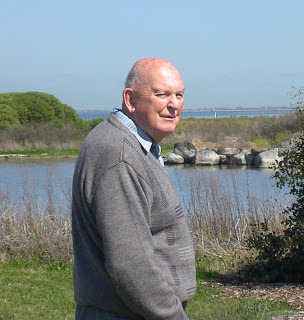 In his last years as the disease took holdThe delusions of dementia meant I would get phone calls at work from him, terribly worried that he was about to be a) deported back to England or b) drafted back into the army. I would assure him that I would speak to the family lawyer and he would sort it out. A quick walk around the office to calm myself and then back on the phone to tell him I had “spoken to John” and it was all OK. That seemed to settle him until the next delusion took hold. He imagined himself back in the grand houses of his childhood…going “upstairs” to change or not wanting to bother the staff. When his beloved cat became ill and had to be hospitalized, he fretted terribly that one of his soldiers was unwell. We took the humour in the situation where we could find it.
In his last years as the disease took holdThe delusions of dementia meant I would get phone calls at work from him, terribly worried that he was about to be a) deported back to England or b) drafted back into the army. I would assure him that I would speak to the family lawyer and he would sort it out. A quick walk around the office to calm myself and then back on the phone to tell him I had “spoken to John” and it was all OK. That seemed to settle him until the next delusion took hold. He imagined himself back in the grand houses of his childhood…going “upstairs” to change or not wanting to bother the staff. When his beloved cat became ill and had to be hospitalized, he fretted terribly that one of his soldiers was unwell. We took the humour in the situation where we could find it.
Mum passed a book on to me… “The Man with Worried Eyes”…I could not bring myself to read it, but the title has stayed with me because it so perfectly captured what I saw in my father (and indeed I now see in other sufferers). He said “My brain is a little funny”…he never really understood his illness or the measures we had to take in coping with it. He viewed the world with worried eyes and my heart slowly broke.
He managed to read (and comment) on my first two published books but by the time I was appointed to the job of my career, of which I knew he would have been so proud, he was lost in another world. When that job of my dreams unraveled twelve months later, the one person to whom I would have turned for advice and wise counsel, my father, was not there.
The day came when Mum could cope no more and we had to move him into a nursing home. Far from being a solution, the nursing home just presented more problems. His sundowners and wandering was annoying other residents and the staff wanted him confined to a secure dementia ward. Oh my God… it was like an 18th century bedlam and in the middle of it was my gentle, loving, trusting father, with his worried eyes. He told my brother "I am in a very bad place". What broke me was seeing him unshaven...my impeccable English gentleman of a father who would never dream of being seen without having shaved and properly dressed (even on holiday!), shambling through those wards, unkempt and cared for. My emotions swung between anger – with him for being ill, the nursing home for the treatment and terrible guilt for feeling that way and grief, deep seated grief – every visit I grieved anew. I hated visiting him in that awful place and, mercifully, in January 2010 we were able to move him to a smaller, more caring facility where in May of that year he died in his own bed, lovingly nursed by the carers he knew.
On our visits to him, we sat and read to him from his own memoirs, the only thing that seemed to keep him still and on my last visit with him, just before his last illness he looked up as I entered the room and said, “It’s Ali”…the first time he had said my name in such a long time although he always seemed to know me. I think in my own resemblance to my mother, he was seeing her as a younger woman, not me. My mother and brother he failed to recognise at all. On that last visit I sat and read to him as usual and on the following Friday came the call we had dreaded. He had developed pneumonia. I’d always heard it referred to as the “old man’s friend” without ever understanding why. What we did know was that he hated his life and if the old man’s friend was going to take him, the time had come.
During that long week, I took time off work, sharing the watch with my brother and mother, sitting in that peaceful room while we played him his favourite music. When I returned home from my watch I found myself unable to do anything so I picked up my pen (in a figurative sense) and wrote-- a light hearted romantic time travel story as far removed from my life as I could send myself – that story became SECRETS IN TIME. I poured myself into that imaginary world, before it was time once again to return to his bedside.
Dad had always said he wanted to outlive his grandfather who had died at age 83. During his last week of life he turned 83. In my diary I wrote “Arthur is slipping away from us and again this gamut of emotions from relief to sorrow…”. We kept the death watch at his bedside and were all with him when he eventually slipped away on a soft autumn evening.
I wrote… “The journey of the last three years from that first diagnosis to now, remains a confused jumble of conflicting emotions from fear to resentment, immense grief and guilt…”. Every time his condition deteriorated a little more meant we grieved anew… Alzheimers is a cruel disease for sufferer and family but I read in the paper today that researchers here in Victoria have moved a step closer to early diagnosis (=early intervention). Would I want to know? I’m not sure-- but what I do want my own family to know is that if decisions have to be made about me, then they are absolved of all guilt. Whatever must be done, as long as it done with love, will be for the best.
It is only now, on the third anniversary of his death, that I feel able to write publicly about my experience and I hope that someone going through the same ordeal will read this and realise they are not alone.
I would also like to use this forum to publicly acknowledge the incredible support my mother (in particular) received from Alzheimers Australia (Victorian branch). The royalties, such as they are, that I will receive from SECRETS IN TIME over this year will be donated to that organization in memory of my father. I hasten to add that it will hardly make much of a blip in their giving program but the book is so intrinsically part of my father’s story that I cannot do otherwise and if another family can be helped then that is where they should go.
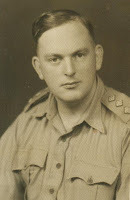 Arthur as a young man
Arthur as a young man
If you read the dedication in my recent release SECRETS IN TIME, you will have seen it reads “This book is dedicated to the memory of my father, Arthur. Still miss you, Dad.” I agonized over this dedication, which is the second dedication to my father (the first is in THE KING’S MAN). I wanted the dedication to be about more than just my father… it was a story that belonged not just to him but to all sufferers of Alzheimers and the people who cared for them, but in the end I brought it back to the deeply personal.
 Arthur in his favourite chair with a book...how I like to remember himThe writing of SECRETS IN TIME is so intrinsically tied up with my father’s last few days, that as the anniversary of his death approaches, I feel, for the sake of all those out there who have lost a loved one to Alzheimers, that the time has come to share my personal experience of this terrible disease.
Arthur in his favourite chair with a book...how I like to remember himThe writing of SECRETS IN TIME is so intrinsically tied up with my father’s last few days, that as the anniversary of his death approaches, I feel, for the sake of all those out there who have lost a loved one to Alzheimers, that the time has come to share my personal experience of this terrible disease.A father always holds a special place in the heart of a daughter and Dad and I were very close. He imbued in me his love of history and literature. Having been brought up in the Edwardian household of his grandparents, with very little contact from his divorced parents, his notions of parenting were, in retrospect, a little strange. A loner all his life, he disliked the bonhomie of “family” holidays, leaving my mother in charge of the two children while he went off on little adventures of his own but oh, we loved it when he was around, reassured by his large, gentle presence. His idea of entertainment (in the days before television) would be to spend Sunday afternoon reading to us. He particularly despised childrens’ books, reading instead his own favourites (which were probably not always suitable!). As a very sick child in hospital with meningitis he spent hours sitting by my bed reading Longfellow’s Hiawatha to me. I may not have understood the words but the cadence of the poetry read with his beautiful, very British accent was soothing to a young child.
 Arthur at my Graduation Ball with the newly commissioned LieutenantAs I grew into a teenager, we still shared our love of history, going to all the latest movies “Cromwell”, “Nicholas and Alexander” (in which I fainted and had to be removed…can’t stand people talking about blood), Elizabeth R, Ann of a Thousand Days etc. He quietly encouraged my writing and we shared long walks along the beach every weekend sharing our thoughts of the week (and annoying a particularly yappy dog, nicknamed by Dad "Drop Dead", by running his walking stick down the fence). He took such pride in every achievement , the greatest of which was being accepted into Law at the University of Melbourne, something he would have liked to study but for the intervention of a war. With romantic notions of the Oxford colleges he never attended, he insisted I move into a residential college and was always there to pick me up and take me back on weekend visits (a round trip of 2 hours). When I was commissioned as an officer in the Australian Army, he was thrilled (as you can see in the photo above - on of the rare photos of us together).
Arthur at my Graduation Ball with the newly commissioned LieutenantAs I grew into a teenager, we still shared our love of history, going to all the latest movies “Cromwell”, “Nicholas and Alexander” (in which I fainted and had to be removed…can’t stand people talking about blood), Elizabeth R, Ann of a Thousand Days etc. He quietly encouraged my writing and we shared long walks along the beach every weekend sharing our thoughts of the week (and annoying a particularly yappy dog, nicknamed by Dad "Drop Dead", by running his walking stick down the fence). He took such pride in every achievement , the greatest of which was being accepted into Law at the University of Melbourne, something he would have liked to study but for the intervention of a war. With romantic notions of the Oxford colleges he never attended, he insisted I move into a residential college and was always there to pick me up and take me back on weekend visits (a round trip of 2 hours). When I was commissioned as an officer in the Australian Army, he was thrilled (as you can see in the photo above - on of the rare photos of us together). Marriage…grandchildren…career highs and lows…Dad was always there to share them and talk through the issues.
The maladies of ageing began to set in and we think, but of course have no proof, that it was the “hormone” treatment for prostate cancer that hastened his illness. It was noticeable after each treatment that he seemed a little more “muddly” and he began to suffer aphasia (loss of speech). In hindsight I realize we were ignoring the obvious symptoms and just putting them down to old age. Along with the aphasia, he began to imagine conspiracies (the next door neighbor was planning to kill his cat). However, mercifully he completed writing his memoirs and was able to participate in a session where we dubbed over the old home movies of our life in Kenya with a commentary. Memories of the dying days of the British Empire preserved forever.
Christmas 2006…the usual gathering in the family home. Dad stood in the kitchen, bewilderment on his face. “Who are all those people?” he asked me. My heart fell. This was not just Dad being muddly, he genuinely did not recognize his own family.
On January 15 2007, while I waited in the first class lounge at Hong Kong Airport (after a birthday trip with my husband), my mother rang with the diagnosis – Alzheimers. Through tears I wrote in my travel diary… “How are you supposed to feel when the reality hits home?...I was going to lose my father in spirit long before the body…Alzheimers is a death sentence without a death…”.
And so it proved… to preserve my mother’s sanity they moved into a retirement village near me. We knew it would send Dad down but he was not the priority. My mother who had married the man she loved within 3 months of meeting was his sole carer. I don’t know how she did it, but that’s her own story to tell. He rapidly developed “sundowners syndrome”… the symptoms of which are described in Wikipedia asIncreased general confusion as natural light begins to fade and increased shadows appear.Agitation and mood swings. Patients may become fairly frustrated with their own confusion as well as aggravated by noise. Patients found yelling and becoming increasingly upset with their caregiver is not uncommon. Mental and physical fatigue increase with the setting of the sun. This fatigue can play a role in the patient's irritability.Tremors may increase and become uncontrollable. A patient may experience an increase in their restlessness while trying to sleep. Restlessness can often lead to pacing and or wandering which can be potentially harmful for a patient in a confused state.He had every symptom. I had always thought Alzheimers resulted in sufferers sitting docilely in armchairs but not Dad-- he could not sit still, a symptom that continued right up until the end, a sore trial for all his carers (and fellow residents). Looking back I marvel at how my mother coped...she plunged the house into darkness from 4.00 pm every afternoon.
 In his last years as the disease took holdThe delusions of dementia meant I would get phone calls at work from him, terribly worried that he was about to be a) deported back to England or b) drafted back into the army. I would assure him that I would speak to the family lawyer and he would sort it out. A quick walk around the office to calm myself and then back on the phone to tell him I had “spoken to John” and it was all OK. That seemed to settle him until the next delusion took hold. He imagined himself back in the grand houses of his childhood…going “upstairs” to change or not wanting to bother the staff. When his beloved cat became ill and had to be hospitalized, he fretted terribly that one of his soldiers was unwell. We took the humour in the situation where we could find it.
In his last years as the disease took holdThe delusions of dementia meant I would get phone calls at work from him, terribly worried that he was about to be a) deported back to England or b) drafted back into the army. I would assure him that I would speak to the family lawyer and he would sort it out. A quick walk around the office to calm myself and then back on the phone to tell him I had “spoken to John” and it was all OK. That seemed to settle him until the next delusion took hold. He imagined himself back in the grand houses of his childhood…going “upstairs” to change or not wanting to bother the staff. When his beloved cat became ill and had to be hospitalized, he fretted terribly that one of his soldiers was unwell. We took the humour in the situation where we could find it. Mum passed a book on to me… “The Man with Worried Eyes”…I could not bring myself to read it, but the title has stayed with me because it so perfectly captured what I saw in my father (and indeed I now see in other sufferers). He said “My brain is a little funny”…he never really understood his illness or the measures we had to take in coping with it. He viewed the world with worried eyes and my heart slowly broke.
He managed to read (and comment) on my first two published books but by the time I was appointed to the job of my career, of which I knew he would have been so proud, he was lost in another world. When that job of my dreams unraveled twelve months later, the one person to whom I would have turned for advice and wise counsel, my father, was not there.
The day came when Mum could cope no more and we had to move him into a nursing home. Far from being a solution, the nursing home just presented more problems. His sundowners and wandering was annoying other residents and the staff wanted him confined to a secure dementia ward. Oh my God… it was like an 18th century bedlam and in the middle of it was my gentle, loving, trusting father, with his worried eyes. He told my brother "I am in a very bad place". What broke me was seeing him unshaven...my impeccable English gentleman of a father who would never dream of being seen without having shaved and properly dressed (even on holiday!), shambling through those wards, unkempt and cared for. My emotions swung between anger – with him for being ill, the nursing home for the treatment and terrible guilt for feeling that way and grief, deep seated grief – every visit I grieved anew. I hated visiting him in that awful place and, mercifully, in January 2010 we were able to move him to a smaller, more caring facility where in May of that year he died in his own bed, lovingly nursed by the carers he knew.
On our visits to him, we sat and read to him from his own memoirs, the only thing that seemed to keep him still and on my last visit with him, just before his last illness he looked up as I entered the room and said, “It’s Ali”…the first time he had said my name in such a long time although he always seemed to know me. I think in my own resemblance to my mother, he was seeing her as a younger woman, not me. My mother and brother he failed to recognise at all. On that last visit I sat and read to him as usual and on the following Friday came the call we had dreaded. He had developed pneumonia. I’d always heard it referred to as the “old man’s friend” without ever understanding why. What we did know was that he hated his life and if the old man’s friend was going to take him, the time had come.
During that long week, I took time off work, sharing the watch with my brother and mother, sitting in that peaceful room while we played him his favourite music. When I returned home from my watch I found myself unable to do anything so I picked up my pen (in a figurative sense) and wrote-- a light hearted romantic time travel story as far removed from my life as I could send myself – that story became SECRETS IN TIME. I poured myself into that imaginary world, before it was time once again to return to his bedside.
Dad had always said he wanted to outlive his grandfather who had died at age 83. During his last week of life he turned 83. In my diary I wrote “Arthur is slipping away from us and again this gamut of emotions from relief to sorrow…”. We kept the death watch at his bedside and were all with him when he eventually slipped away on a soft autumn evening.
I wrote… “The journey of the last three years from that first diagnosis to now, remains a confused jumble of conflicting emotions from fear to resentment, immense grief and guilt…”. Every time his condition deteriorated a little more meant we grieved anew… Alzheimers is a cruel disease for sufferer and family but I read in the paper today that researchers here in Victoria have moved a step closer to early diagnosis (=early intervention). Would I want to know? I’m not sure-- but what I do want my own family to know is that if decisions have to be made about me, then they are absolved of all guilt. Whatever must be done, as long as it done with love, will be for the best.
It is only now, on the third anniversary of his death, that I feel able to write publicly about my experience and I hope that someone going through the same ordeal will read this and realise they are not alone.
I would also like to use this forum to publicly acknowledge the incredible support my mother (in particular) received from Alzheimers Australia (Victorian branch). The royalties, such as they are, that I will receive from SECRETS IN TIME over this year will be donated to that organization in memory of my father. I hasten to add that it will hardly make much of a blip in their giving program but the book is so intrinsically part of my father’s story that I cannot do otherwise and if another family can be helped then that is where they should go.
 Arthur as a young man
Arthur as a young man
Published on May 06, 2013 00:30
April 28, 2013
Getting to Know You...The Liebster Award
I've been nominated for the Liebster Blog Award Challenge by ANITA DAVISON (also writing as Anita Seymour), author of the Royalist Rebel and also by ANNIE SEATON, author of A Holiday Affair and other great books...and also a fabulous freelance editor. Rather than do two different blogs, I have joined them together!

The purpose of the challenge is to help bloggers increase their followers. I have to tell you eleven little known things about me and then answer eleven set questions and nominate eleven other bloggers to take the challenge after me.
For the nominees below:
Post on your own blog, linking back here, with eleven random facts, answer my eleven questions and nominate eleven new bloggers with eleven questions to ask them! Don't forget to link back to me so I can read your answers :-)
OK here goes:
 Alison on the Camino Santiago de CompostelaEleven little known facts about Alison Stuart: As a child I almost died of meningitis I am an Anglican Church lay reader I have walked the Camino Santiago de Compostela (or at least the last 115kms) I have visited a refugee camp on the Thai Burma Border to teach a group of amazing young women at the Karen Young Women’s Leadership School about the United Nations conventions on the rights of women.I love needlework - cross stitch and patchwork/quiltingI am owned by 2 cats - the Kat brothers, Oliver and TobyI am a CapricornI own very few "How to Write" books - hubris or fear? In my younger days I did a bit of amateur musical theatre...mostly Gilbert & Sullivan which probably accounts for the Ruddigore references in GATHER THE BONES.My favourite thing to do on holidays is go on ghost tours. I only like dark chocolate...good dark chocolate.
Alison on the Camino Santiago de CompostelaEleven little known facts about Alison Stuart: As a child I almost died of meningitis I am an Anglican Church lay reader I have walked the Camino Santiago de Compostela (or at least the last 115kms) I have visited a refugee camp on the Thai Burma Border to teach a group of amazing young women at the Karen Young Women’s Leadership School about the United Nations conventions on the rights of women.I love needlework - cross stitch and patchwork/quiltingI am owned by 2 cats - the Kat brothers, Oliver and TobyI am a CapricornI own very few "How to Write" books - hubris or fear? In my younger days I did a bit of amateur musical theatre...mostly Gilbert & Sullivan which probably accounts for the Ruddigore references in GATHER THE BONES.My favourite thing to do on holidays is go on ghost tours. I only like dark chocolate...good dark chocolate.
 Alison (far left) at the Karen Young Womens' Leadership School in 2006
Alison (far left) at the Karen Young Womens' Leadership School in 2006
Annie's Questions:What sort of books do you like to read? Crime and mystery. Do you believe in love at first sight? Yes When the coffee runs out, what do you like to drink? Gin and tonic Do you prefer sad or happy endings? Has to be a happy ending. Too many sad endings in real life. If you could meet anyone and spend an hour with them alive or dead, who and why? I would like to meet my great+ grandmother Helene deMestre and find out the real story behind her 3 husbands.. .What did you do all day before the internet was invented? I did a lot more sewing and needlework and I actually wrote books. What is your favourite movie? Depends on my mood...but LOVE ACTUALLY is a repeat viewing in my house. What is your ideal holiday destination? My husband and I love getting out into the Australian outback...even if it takes 3 days driving! What's your favourite thing to do when you're not writing? Needlework Do you have a book in your house that's just destroyed because you've read it so much? Jane Eyre by Charlotte Bronte (the original edition I bought in Haworth when I was 11) Do you set yourself some strict rules while writing? Rules are made for breaking...
Anita's Questions
Belgian chocolate or Pino Grigio? Belgian chocolate - purchased from the Corne Royale shop in Brussels just off the Grande Place... Ryan Reynolds or Matt Damon? Those are my only choices...? Ben and Jerry’s [any flavour] or crème brulee? Creme brulee...never tasted Ben & Jerrys (American icecream isn't it?) Orlando Bloom or Johnny Deppe? Tough call...Loved Orlando in LOTR and Johnny in Chocolat, Roasted duck breast or grilled goat’s cheese? Can't I have both?Gourmet dinner out or nachos and salsa in front of the TV? See answer to 5 above... Jamie Oliver or Raymond Blanc? Jamie! Christmas turkey with cranberry sauce or goose with spiced orange sauce? See answer to 5 above... Jason Statham or Daniel Craig? Daniel. Who would you cast as the hero in a film made of your latest novel? Only one actor could have played Paul Morrow in GATHER THE BONES - the young Nigel Havers Who would you cast as the heroine in a film made of your latest novel? For Helen Morrow, the Australian heroine of GATHER THE BONES - Jessica Marais Nigel Havers contemplating the role of Paul Morrow!And now for my nominees:Rachael Johns (Award winning stories from the Australian outback)Suzi Love (Hot regency)Imelda Evans (contemporary romance)Louise Reynolds (contemporary romance)Nicola Flockton (contemporary romance)Bronwyn Stuart (gorgeous regencies)Keziah Hill (erotic romance and romantic suspense)Ella Quinn (gorgeous regencies)Karen Aminadra (Jane Austen expanded)Maggie Nash (romances with spice)Jennifer Brassel (contemporary with a touch of supernatural)And here's my questions for them:Gold or silver?Best book read in the last 12 months?Happiest memory of childhood?Favourite season?If you could travel anywhere in the world and money was no object...where would you go and why?Favourite TV show?What is the one skill you wished you possessed?What is your most favourite post from your own blog?What is a favourite post from someone else's blog?Any phobias?Two sentences to describe your latest (or just about to be released book)?Hope you enjoy getting to know some "new to you" authors :-)
Nigel Havers contemplating the role of Paul Morrow!And now for my nominees:Rachael Johns (Award winning stories from the Australian outback)Suzi Love (Hot regency)Imelda Evans (contemporary romance)Louise Reynolds (contemporary romance)Nicola Flockton (contemporary romance)Bronwyn Stuart (gorgeous regencies)Keziah Hill (erotic romance and romantic suspense)Ella Quinn (gorgeous regencies)Karen Aminadra (Jane Austen expanded)Maggie Nash (romances with spice)Jennifer Brassel (contemporary with a touch of supernatural)And here's my questions for them:Gold or silver?Best book read in the last 12 months?Happiest memory of childhood?Favourite season?If you could travel anywhere in the world and money was no object...where would you go and why?Favourite TV show?What is the one skill you wished you possessed?What is your most favourite post from your own blog?What is a favourite post from someone else's blog?Any phobias?Two sentences to describe your latest (or just about to be released book)?Hope you enjoy getting to know some "new to you" authors :-)

The purpose of the challenge is to help bloggers increase their followers. I have to tell you eleven little known things about me and then answer eleven set questions and nominate eleven other bloggers to take the challenge after me.
For the nominees below:
Post on your own blog, linking back here, with eleven random facts, answer my eleven questions and nominate eleven new bloggers with eleven questions to ask them! Don't forget to link back to me so I can read your answers :-)
OK here goes:
 Alison on the Camino Santiago de CompostelaEleven little known facts about Alison Stuart: As a child I almost died of meningitis I am an Anglican Church lay reader I have walked the Camino Santiago de Compostela (or at least the last 115kms) I have visited a refugee camp on the Thai Burma Border to teach a group of amazing young women at the Karen Young Women’s Leadership School about the United Nations conventions on the rights of women.I love needlework - cross stitch and patchwork/quiltingI am owned by 2 cats - the Kat brothers, Oliver and TobyI am a CapricornI own very few "How to Write" books - hubris or fear? In my younger days I did a bit of amateur musical theatre...mostly Gilbert & Sullivan which probably accounts for the Ruddigore references in GATHER THE BONES.My favourite thing to do on holidays is go on ghost tours. I only like dark chocolate...good dark chocolate.
Alison on the Camino Santiago de CompostelaEleven little known facts about Alison Stuart: As a child I almost died of meningitis I am an Anglican Church lay reader I have walked the Camino Santiago de Compostela (or at least the last 115kms) I have visited a refugee camp on the Thai Burma Border to teach a group of amazing young women at the Karen Young Women’s Leadership School about the United Nations conventions on the rights of women.I love needlework - cross stitch and patchwork/quiltingI am owned by 2 cats - the Kat brothers, Oliver and TobyI am a CapricornI own very few "How to Write" books - hubris or fear? In my younger days I did a bit of amateur musical theatre...mostly Gilbert & Sullivan which probably accounts for the Ruddigore references in GATHER THE BONES.My favourite thing to do on holidays is go on ghost tours. I only like dark chocolate...good dark chocolate.
 Alison (far left) at the Karen Young Womens' Leadership School in 2006
Alison (far left) at the Karen Young Womens' Leadership School in 2006
Annie's Questions:What sort of books do you like to read? Crime and mystery. Do you believe in love at first sight? Yes When the coffee runs out, what do you like to drink? Gin and tonic Do you prefer sad or happy endings? Has to be a happy ending. Too many sad endings in real life. If you could meet anyone and spend an hour with them alive or dead, who and why? I would like to meet my great+ grandmother Helene deMestre and find out the real story behind her 3 husbands.. .What did you do all day before the internet was invented? I did a lot more sewing and needlework and I actually wrote books. What is your favourite movie? Depends on my mood...but LOVE ACTUALLY is a repeat viewing in my house. What is your ideal holiday destination? My husband and I love getting out into the Australian outback...even if it takes 3 days driving! What's your favourite thing to do when you're not writing? Needlework Do you have a book in your house that's just destroyed because you've read it so much? Jane Eyre by Charlotte Bronte (the original edition I bought in Haworth when I was 11) Do you set yourself some strict rules while writing? Rules are made for breaking...
Anita's Questions
Belgian chocolate or Pino Grigio? Belgian chocolate - purchased from the Corne Royale shop in Brussels just off the Grande Place... Ryan Reynolds or Matt Damon? Those are my only choices...? Ben and Jerry’s [any flavour] or crème brulee? Creme brulee...never tasted Ben & Jerrys (American icecream isn't it?) Orlando Bloom or Johnny Deppe? Tough call...Loved Orlando in LOTR and Johnny in Chocolat, Roasted duck breast or grilled goat’s cheese? Can't I have both?Gourmet dinner out or nachos and salsa in front of the TV? See answer to 5 above... Jamie Oliver or Raymond Blanc? Jamie! Christmas turkey with cranberry sauce or goose with spiced orange sauce? See answer to 5 above... Jason Statham or Daniel Craig? Daniel. Who would you cast as the hero in a film made of your latest novel? Only one actor could have played Paul Morrow in GATHER THE BONES - the young Nigel Havers Who would you cast as the heroine in a film made of your latest novel? For Helen Morrow, the Australian heroine of GATHER THE BONES - Jessica Marais
 Nigel Havers contemplating the role of Paul Morrow!And now for my nominees:Rachael Johns (Award winning stories from the Australian outback)Suzi Love (Hot regency)Imelda Evans (contemporary romance)Louise Reynolds (contemporary romance)Nicola Flockton (contemporary romance)Bronwyn Stuart (gorgeous regencies)Keziah Hill (erotic romance and romantic suspense)Ella Quinn (gorgeous regencies)Karen Aminadra (Jane Austen expanded)Maggie Nash (romances with spice)Jennifer Brassel (contemporary with a touch of supernatural)And here's my questions for them:Gold or silver?Best book read in the last 12 months?Happiest memory of childhood?Favourite season?If you could travel anywhere in the world and money was no object...where would you go and why?Favourite TV show?What is the one skill you wished you possessed?What is your most favourite post from your own blog?What is a favourite post from someone else's blog?Any phobias?Two sentences to describe your latest (or just about to be released book)?Hope you enjoy getting to know some "new to you" authors :-)
Nigel Havers contemplating the role of Paul Morrow!And now for my nominees:Rachael Johns (Award winning stories from the Australian outback)Suzi Love (Hot regency)Imelda Evans (contemporary romance)Louise Reynolds (contemporary romance)Nicola Flockton (contemporary romance)Bronwyn Stuart (gorgeous regencies)Keziah Hill (erotic romance and romantic suspense)Ella Quinn (gorgeous regencies)Karen Aminadra (Jane Austen expanded)Maggie Nash (romances with spice)Jennifer Brassel (contemporary with a touch of supernatural)And here's my questions for them:Gold or silver?Best book read in the last 12 months?Happiest memory of childhood?Favourite season?If you could travel anywhere in the world and money was no object...where would you go and why?Favourite TV show?What is the one skill you wished you possessed?What is your most favourite post from your own blog?What is a favourite post from someone else's blog?Any phobias?Two sentences to describe your latest (or just about to be released book)?Hope you enjoy getting to know some "new to you" authors :-)
Published on April 28, 2013 16:13
April 24, 2013
Calling fans of GATHER THE BONES - the RONE AWARD
As a small press published author, I try very hard not to be too 'needy' but if you read (and liked) GATHER THE BONES, I hope you don't mind if I put out a special request for your support.
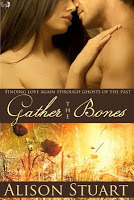
GATHER THE BONES has been nominated for the RONE Award. The RONE awards are organised by InD'tale Magazine, a huge supporter of indie and small press published books. They reviewed GATHER THE BONES late last year, giving it a 4.5 star review. To read the review click HERE. As a consequence of this review, the book qualified for the RONE awards and is up for voting by fans. If it is successful in this round it will be read by industry professionals.
"The finalists in this round will then be read and judged by a group of professionals in the industry to determine the very best in indie and small published books of 2012. They will then be awarded the prestigious RONE award, itself, at the formal ceremonies, August 9th, at the Golden Nugget Hotel in Las Vegas, Nevada.
As you can tell, we at InD’Tale magazine went to extensive labor to create and present the most credible and prestigious award in the industry today. Our three round system of elimination covers every facet - highly reviewed, loved by fans, and critiqued by qualified judges. No other award system today begins to compare, making the RONE award the very highest of honors bestowed on a book in the publishing industry."
So if you have read and loved GATHER THE BONES, please visit the InD'tale website and cast a vote for GATHER THE BONES.
 For a direct link to the InDtale website please click HERE
For a direct link to the InDtale website please click HERE

GATHER THE BONES has been nominated for the RONE Award. The RONE awards are organised by InD'tale Magazine, a huge supporter of indie and small press published books. They reviewed GATHER THE BONES late last year, giving it a 4.5 star review. To read the review click HERE. As a consequence of this review, the book qualified for the RONE awards and is up for voting by fans. If it is successful in this round it will be read by industry professionals.
"The finalists in this round will then be read and judged by a group of professionals in the industry to determine the very best in indie and small published books of 2012. They will then be awarded the prestigious RONE award, itself, at the formal ceremonies, August 9th, at the Golden Nugget Hotel in Las Vegas, Nevada.
As you can tell, we at InD’Tale magazine went to extensive labor to create and present the most credible and prestigious award in the industry today. Our three round system of elimination covers every facet - highly reviewed, loved by fans, and critiqued by qualified judges. No other award system today begins to compare, making the RONE award the very highest of honors bestowed on a book in the publishing industry."
So if you have read and loved GATHER THE BONES, please visit the InD'tale website and cast a vote for GATHER THE BONES.
 For a direct link to the InDtale website please click HERE
For a direct link to the InDtale website please click HERE
Published on April 24, 2013 18:48
April 23, 2013
GATHER THE BONES...nominated for Goodreads Book of the Month
I am gobsmacked to find GATHER THE BONES is among the company of those books nominated for Goodreads Book of the Month.
If you read this book (and liked it!) please, please drop in and give it a vote :-)
https://www.goodreads.com/poll/show/8...
Very best wishes
Alison
PS I didn't nominate it!
If you read this book (and liked it!) please, please drop in and give it a vote :-)
https://www.goodreads.com/poll/show/8...

Very best wishes
Alison
PS I didn't nominate it!
Published on April 23, 2013 21:10
•
Tags:
alison-stuart
April 21, 2013
HINT OF HISTORY - ANZAC DAY
April 25th is ANZAC Day here in Australia and, knowing I have readers who are not Australian or New Zealanders I thought I would talk a little bit about ANZAC Day and what it means to us.

I think every country in the world has its own day of remembrance and commemoration for those who have fought and died in the conflicts of the world. Americans have Veterans Day, the British have Remembrance Day and in Australia we have ANZAC day, commemorated on April 25th every year.
ANZAC literally means the “Australian and New Zealand Army Corps”… the young men gathered from this far flung corner of the British Empire who sailed off in 1914 to help defend “the mother country”. The young men who boarded the troop transports at Princes Pier here in Melbourne, probably didn’t even understand quite what it was they were going to defend the mother country from. All they knew was that England had called and it was a good excuse for an adventure.
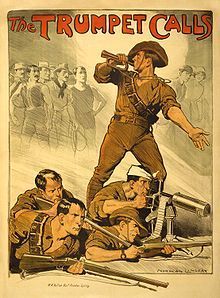
Although, I have no direct Australian connection to ANZAC day (my own grandfather fought in the British army as a medic in Mesopotamia and in an earlier blog I have written of my search for the grave of my father’s cousin on the western front - Tears on the Western Front), I served in the Australian Defence Forces for nearly twenty years and I have followed my husband’s researches of his own grandfather, EAB, who went to war in 1915, was wounded in the arm and returned home in 1919.
In 1914 Australia as a country was only 13 years old, having achieved its independence from Britain in 1901. The total population was only 4 million but the ties with England were still strong and in England’s hour of need a generation of young Australian men answered the call. Over 400,000 thousand enlisted to serve in the AIF (the Australian Imperial Force) - 10% of its entire population. Back to statistics later but remember that number.
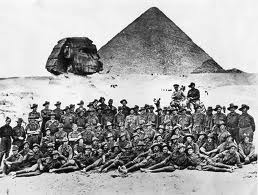 Australian soldiers in Egypt
Australian soldiers in Egypt
The big adventure started in Egypt. Wearing their distinctive slouch hats, the young soldiers explored the souks, had their photographs taken, visited the pyramids and rode camels. Anything further from Australia they could not have imagined. The British officers were heard to complain about their disrespectful attitude and their larrikin ways.
In far off London, the secretary for the navy, Winston Churchill was planning a campaign to seize the Dardanelles (the narrow entrance to the Black Sea) by attacking the Gallipoli peninsular, firmly held by the Turks under Mustafa Kemal (later known as Ataturk). Having failed to take the Gallipoli Peninsula with a naval attack, he decided to send in land troops. Key to this invasion were the ANZACs and on 25 April 1915 they landed at ANZAC cove and Suvla Bay. Confronting them were cliffs and the heavily dug in and armed Turkish forces. They came under heavy fire even as they struggled ashore. The campaign was doomed for failure even before it began.
 The Gallipoli Campaign...the Australians landed in the northThe Australians and New Zealanders showed incredible bravery and forced their way up the cliffs establishing positions along the front but the Turks were too well dug in and for 8 long months a stalemate ensued. Attacks on Lone Pine and the Nek were repulsed with heavy casualties on the Australians side. In December 1915 the most successful manouevre of the whole campaign was conducted with minimal casualties...the withdrawal from the Gallipoli peninsular.
The Gallipoli Campaign...the Australians landed in the northThe Australians and New Zealanders showed incredible bravery and forced their way up the cliffs establishing positions along the front but the Turks were too well dug in and for 8 long months a stalemate ensued. Attacks on Lone Pine and the Nek were repulsed with heavy casualties on the Australians side. In December 1915 the most successful manouevre of the whole campaign was conducted with minimal casualties...the withdrawal from the Gallipoli peninsular.
In 1934 Atatürk wrote a tribute to the ANZACs killed at Gallipoli:
"Those heroes that shed their blood and lost their lives... You are now lying in the soil of a friendly country. Therefore rest in peace. There is no difference between the Johnnies and the Mehmets to us where they lie side by side now here in this country of ours... you, the mothers, who sent their sons from faraway countries wipe away your tears; your sons are now lying in our bosom and are in peace. After having lost their lives on this land. They have become our sons as well."
(This inscription appears on the Kemal Atatürk Memorial, ANZAC Parade, Canberra)
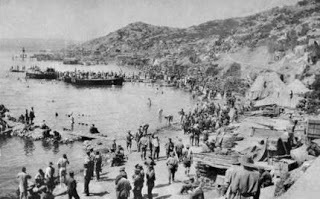 The Australians at Anzac CoveThe irony that one of the most seminal moments in Australian history was technically a massive defeat is not lost on the Australians. What is remembered is that Gallipoli had been a bitter blooding, a hard coming of age. 8,709 young Australians never left the Gallipoli peninsula and lie interred in the Commonwealth Cemetery at ANZAC cove. But if Gallipoli had been hard, worse was yet to come. The Australians were sent to the Western Front where for another 3 long years they fought and died for the “mother country”. As the only battle seasoned troops on the Western Front they tended to be used as “shock troops” and suffered commensurate casualty rates, amongst the highest of all the allies.
The Australians at Anzac CoveThe irony that one of the most seminal moments in Australian history was technically a massive defeat is not lost on the Australians. What is remembered is that Gallipoli had been a bitter blooding, a hard coming of age. 8,709 young Australians never left the Gallipoli peninsula and lie interred in the Commonwealth Cemetery at ANZAC cove. But if Gallipoli had been hard, worse was yet to come. The Australians were sent to the Western Front where for another 3 long years they fought and died for the “mother country”. As the only battle seasoned troops on the Western Front they tended to be used as “shock troops” and suffered commensurate casualty rates, amongst the highest of all the allies.
My husband’s grandfather was among the second wave to land at Gallipoli and he talked quite freely about his time there so much so that the family assumed he had been wounded there. It was only when my husband started his researches that he discovered that EAB had survived Gallipoli and had sustained his wound on the Somme in November 1916 (only a few months and a few miles from where Richard Conway-Lowe, my own forebear, died in August of that year). He never spoke about the Western Front. In 1919 he returned to Australia with an arm held together with twitching wire, cleared a soldier settlement block in the Riverland of South Australia, married and raised a family. He died of a heart attack on an ANZAC day march in the 1960s.
Remember the 400,000 men who went to war? According to historian Patsy Adam Smith:
died 58,961wounded 166,811missing or prisoners of war 4,098suffered from sickness 87,865
"At almost 65%, the Australian casualty rate (proportionate to total embarkations) was the highest of the war."
As a percentage of the Australian population, nearly an entire generation of young men had been wiped out or were in some way left impaired by the War (part of the story behind my own novel, GATHER THE BONES).
ANZAC day itself was formally gazetted as a public holiday in 1921 , although its observance had begun as early as 1916. As a child growing up in Australia in the 1960s and 70s, in the midst of another unpopular war being fought in Vietnam, ANZAC day became almost reviled. Protesters would line the streets, hurling abuse at the old soldiers as they marched past. It was thought as the last of those who served in the Great War died and the ranks of those who fought in the second grew thinner, that ANZAC day would lose its meaning and like the old soldiers just “fade away”.
I don’t know what happened, what changed but in the 1990s, a new generation discovered ANZAC day--whether it was being taught in schools or it was part of a wave of national pride or a real understanding about what the lives of those young men who died in that terrible war really meant. The crowds at the ANZAC day marches and dawn services began to grow, a new generation wearing their grandfather’s campaign medals started to march behind the battalion colours. Today the dawn service at Gallipoli in Turkey is the site of a mass pilgrimage of young Australians every year.
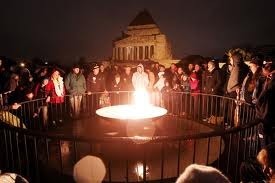 The Dawn Service at Melbourne's Shrine of Remembrance The traditions of ANZAC day are part of our genetic make up. The dawn service, the playing of the last post, the words “Lest we Forget”, followed by marches, wreath laying, the gunfire breakfasts and the games of "two up" and the baking of home made Anzac biscuits.
The Dawn Service at Melbourne's Shrine of Remembrance The traditions of ANZAC day are part of our genetic make up. The dawn service, the playing of the last post, the words “Lest we Forget”, followed by marches, wreath laying, the gunfire breakfasts and the games of "two up" and the baking of home made Anzac biscuits.
To me, as a soldier, ANZAC day was an important part of the year, beginning as a private soldier in a hastily cobbled together drum corps (as I have no sense of rhythm my career as a drummer was shortlived!), to a young officer helping the parade marshalls. My husband, an infantry company commander, frequently marched with his soldiers. We enjoyed many a “gunfire” breakfast – tea and whiskey and avoided losing our money at two up. I have worn the slouch hat with its distinctive "rising sun" hat badge with incredible pride, conscious of the men and women who went before me.
For the three years we lived in Singapore, we attended the dawn service held at Kranji War Cemetery, where another generation of young Australian lie buried – those who fell in the defence of Singapore in 1942. A lone piper stood high above us on the roof of the memorial as the day broke through the humidity over the peaceful green sward, peppered with its simple white gravestones.
I have been to the dawn service in Paris, stood on the battlefields of France where Richard Conway-Lowe died and where my husband’s grandfather was wounded, attended the ANZAC Day commemorations on the Somme and sung the Australian national anthem and the Marseilles so many times I became hoarse. I have shared breakfast at the little school in Villers Brettoneux, paid for by fundraising from Victorian school children after the war. This little village had been liberated by the Australian troops on Anzac Day 1918. Around the walls of the school hall with its carved Australian animals are the words. “Nous n’oublions pas l’Australie”. We will never forget Australia.
LEST WE FORGET
Excerpt from GATHER THE BONES by Alison Stuart. In this excerpt Helen Morrow reflects on the moment when her husband and brother decided to join up. Her husband, Charlie, did not return.
"The photograph showed two young men in the uniform of infantry officers, one seated and the other standing, a photograph like thousands of others that were now the last link with the dead. Helen had a single portrait of Charlie, taken at the same photographic session, sporting an elegant, unfamiliar moustache and grinning from ear to ear, like an over-anxious school boy, keen to join the ‘stoush’, kill the ‘bloody Bosch’. She felt a keen sense of pain that reverberated as strongly as it had on the day he told her he would have to return to England.
“I can’t leave them to fight the Huns, Helen,” he said. “Damn it, I have a duty to England.”
The drunken words came back to her and she could see Charlie in the kitchen of Terrala with his arm across her brother Henry’s shoulders, as they celebrated their mutual decision to join the war.
Henry had already enlisted in the Australian Light Horse and Charlie told her a few days later that he intended to return to England to join his cousin’s regiment.
“Do you think I would leave Paul to uphold the family honor?” he said. And he’d gone.
Even as she had stood on the dock at Port Melbourne, the cold winter wind whipping at her ankles, she had known he would not return. She wondered if his decision to go would have been any different if they had known she was carrying his child. Probably not."

I think every country in the world has its own day of remembrance and commemoration for those who have fought and died in the conflicts of the world. Americans have Veterans Day, the British have Remembrance Day and in Australia we have ANZAC day, commemorated on April 25th every year.
ANZAC literally means the “Australian and New Zealand Army Corps”… the young men gathered from this far flung corner of the British Empire who sailed off in 1914 to help defend “the mother country”. The young men who boarded the troop transports at Princes Pier here in Melbourne, probably didn’t even understand quite what it was they were going to defend the mother country from. All they knew was that England had called and it was a good excuse for an adventure.

Although, I have no direct Australian connection to ANZAC day (my own grandfather fought in the British army as a medic in Mesopotamia and in an earlier blog I have written of my search for the grave of my father’s cousin on the western front - Tears on the Western Front), I served in the Australian Defence Forces for nearly twenty years and I have followed my husband’s researches of his own grandfather, EAB, who went to war in 1915, was wounded in the arm and returned home in 1919.
In 1914 Australia as a country was only 13 years old, having achieved its independence from Britain in 1901. The total population was only 4 million but the ties with England were still strong and in England’s hour of need a generation of young Australian men answered the call. Over 400,000 thousand enlisted to serve in the AIF (the Australian Imperial Force) - 10% of its entire population. Back to statistics later but remember that number.
 Australian soldiers in Egypt
Australian soldiers in EgyptThe big adventure started in Egypt. Wearing their distinctive slouch hats, the young soldiers explored the souks, had their photographs taken, visited the pyramids and rode camels. Anything further from Australia they could not have imagined. The British officers were heard to complain about their disrespectful attitude and their larrikin ways.
In far off London, the secretary for the navy, Winston Churchill was planning a campaign to seize the Dardanelles (the narrow entrance to the Black Sea) by attacking the Gallipoli peninsular, firmly held by the Turks under Mustafa Kemal (later known as Ataturk). Having failed to take the Gallipoli Peninsula with a naval attack, he decided to send in land troops. Key to this invasion were the ANZACs and on 25 April 1915 they landed at ANZAC cove and Suvla Bay. Confronting them were cliffs and the heavily dug in and armed Turkish forces. They came under heavy fire even as they struggled ashore. The campaign was doomed for failure even before it began.
 The Gallipoli Campaign...the Australians landed in the northThe Australians and New Zealanders showed incredible bravery and forced their way up the cliffs establishing positions along the front but the Turks were too well dug in and for 8 long months a stalemate ensued. Attacks on Lone Pine and the Nek were repulsed with heavy casualties on the Australians side. In December 1915 the most successful manouevre of the whole campaign was conducted with minimal casualties...the withdrawal from the Gallipoli peninsular.
The Gallipoli Campaign...the Australians landed in the northThe Australians and New Zealanders showed incredible bravery and forced their way up the cliffs establishing positions along the front but the Turks were too well dug in and for 8 long months a stalemate ensued. Attacks on Lone Pine and the Nek were repulsed with heavy casualties on the Australians side. In December 1915 the most successful manouevre of the whole campaign was conducted with minimal casualties...the withdrawal from the Gallipoli peninsular. In 1934 Atatürk wrote a tribute to the ANZACs killed at Gallipoli:
"Those heroes that shed their blood and lost their lives... You are now lying in the soil of a friendly country. Therefore rest in peace. There is no difference between the Johnnies and the Mehmets to us where they lie side by side now here in this country of ours... you, the mothers, who sent their sons from faraway countries wipe away your tears; your sons are now lying in our bosom and are in peace. After having lost their lives on this land. They have become our sons as well."
(This inscription appears on the Kemal Atatürk Memorial, ANZAC Parade, Canberra)
 The Australians at Anzac CoveThe irony that one of the most seminal moments in Australian history was technically a massive defeat is not lost on the Australians. What is remembered is that Gallipoli had been a bitter blooding, a hard coming of age. 8,709 young Australians never left the Gallipoli peninsula and lie interred in the Commonwealth Cemetery at ANZAC cove. But if Gallipoli had been hard, worse was yet to come. The Australians were sent to the Western Front where for another 3 long years they fought and died for the “mother country”. As the only battle seasoned troops on the Western Front they tended to be used as “shock troops” and suffered commensurate casualty rates, amongst the highest of all the allies.
The Australians at Anzac CoveThe irony that one of the most seminal moments in Australian history was technically a massive defeat is not lost on the Australians. What is remembered is that Gallipoli had been a bitter blooding, a hard coming of age. 8,709 young Australians never left the Gallipoli peninsula and lie interred in the Commonwealth Cemetery at ANZAC cove. But if Gallipoli had been hard, worse was yet to come. The Australians were sent to the Western Front where for another 3 long years they fought and died for the “mother country”. As the only battle seasoned troops on the Western Front they tended to be used as “shock troops” and suffered commensurate casualty rates, amongst the highest of all the allies.My husband’s grandfather was among the second wave to land at Gallipoli and he talked quite freely about his time there so much so that the family assumed he had been wounded there. It was only when my husband started his researches that he discovered that EAB had survived Gallipoli and had sustained his wound on the Somme in November 1916 (only a few months and a few miles from where Richard Conway-Lowe, my own forebear, died in August of that year). He never spoke about the Western Front. In 1919 he returned to Australia with an arm held together with twitching wire, cleared a soldier settlement block in the Riverland of South Australia, married and raised a family. He died of a heart attack on an ANZAC day march in the 1960s.
Remember the 400,000 men who went to war? According to historian Patsy Adam Smith:
died 58,961wounded 166,811missing or prisoners of war 4,098suffered from sickness 87,865
"At almost 65%, the Australian casualty rate (proportionate to total embarkations) was the highest of the war."
As a percentage of the Australian population, nearly an entire generation of young men had been wiped out or were in some way left impaired by the War (part of the story behind my own novel, GATHER THE BONES).
ANZAC day itself was formally gazetted as a public holiday in 1921 , although its observance had begun as early as 1916. As a child growing up in Australia in the 1960s and 70s, in the midst of another unpopular war being fought in Vietnam, ANZAC day became almost reviled. Protesters would line the streets, hurling abuse at the old soldiers as they marched past. It was thought as the last of those who served in the Great War died and the ranks of those who fought in the second grew thinner, that ANZAC day would lose its meaning and like the old soldiers just “fade away”.
I don’t know what happened, what changed but in the 1990s, a new generation discovered ANZAC day--whether it was being taught in schools or it was part of a wave of national pride or a real understanding about what the lives of those young men who died in that terrible war really meant. The crowds at the ANZAC day marches and dawn services began to grow, a new generation wearing their grandfather’s campaign medals started to march behind the battalion colours. Today the dawn service at Gallipoli in Turkey is the site of a mass pilgrimage of young Australians every year.
 The Dawn Service at Melbourne's Shrine of Remembrance The traditions of ANZAC day are part of our genetic make up. The dawn service, the playing of the last post, the words “Lest we Forget”, followed by marches, wreath laying, the gunfire breakfasts and the games of "two up" and the baking of home made Anzac biscuits.
The Dawn Service at Melbourne's Shrine of Remembrance The traditions of ANZAC day are part of our genetic make up. The dawn service, the playing of the last post, the words “Lest we Forget”, followed by marches, wreath laying, the gunfire breakfasts and the games of "two up" and the baking of home made Anzac biscuits.To me, as a soldier, ANZAC day was an important part of the year, beginning as a private soldier in a hastily cobbled together drum corps (as I have no sense of rhythm my career as a drummer was shortlived!), to a young officer helping the parade marshalls. My husband, an infantry company commander, frequently marched with his soldiers. We enjoyed many a “gunfire” breakfast – tea and whiskey and avoided losing our money at two up. I have worn the slouch hat with its distinctive "rising sun" hat badge with incredible pride, conscious of the men and women who went before me.
For the three years we lived in Singapore, we attended the dawn service held at Kranji War Cemetery, where another generation of young Australian lie buried – those who fell in the defence of Singapore in 1942. A lone piper stood high above us on the roof of the memorial as the day broke through the humidity over the peaceful green sward, peppered with its simple white gravestones.
I have been to the dawn service in Paris, stood on the battlefields of France where Richard Conway-Lowe died and where my husband’s grandfather was wounded, attended the ANZAC Day commemorations on the Somme and sung the Australian national anthem and the Marseilles so many times I became hoarse. I have shared breakfast at the little school in Villers Brettoneux, paid for by fundraising from Victorian school children after the war. This little village had been liberated by the Australian troops on Anzac Day 1918. Around the walls of the school hall with its carved Australian animals are the words. “Nous n’oublions pas l’Australie”. We will never forget Australia.
LEST WE FORGET
Excerpt from GATHER THE BONES by Alison Stuart. In this excerpt Helen Morrow reflects on the moment when her husband and brother decided to join up. Her husband, Charlie, did not return.
"The photograph showed two young men in the uniform of infantry officers, one seated and the other standing, a photograph like thousands of others that were now the last link with the dead. Helen had a single portrait of Charlie, taken at the same photographic session, sporting an elegant, unfamiliar moustache and grinning from ear to ear, like an over-anxious school boy, keen to join the ‘stoush’, kill the ‘bloody Bosch’. She felt a keen sense of pain that reverberated as strongly as it had on the day he told her he would have to return to England.
“I can’t leave them to fight the Huns, Helen,” he said. “Damn it, I have a duty to England.”
The drunken words came back to her and she could see Charlie in the kitchen of Terrala with his arm across her brother Henry’s shoulders, as they celebrated their mutual decision to join the war.
Henry had already enlisted in the Australian Light Horse and Charlie told her a few days later that he intended to return to England to join his cousin’s regiment.
“Do you think I would leave Paul to uphold the family honor?” he said. And he’d gone.
Even as she had stood on the dock at Port Melbourne, the cold winter wind whipping at her ankles, she had known he would not return. She wondered if his decision to go would have been any different if they had known she was carrying his child. Probably not."
Published on April 21, 2013 21:21



